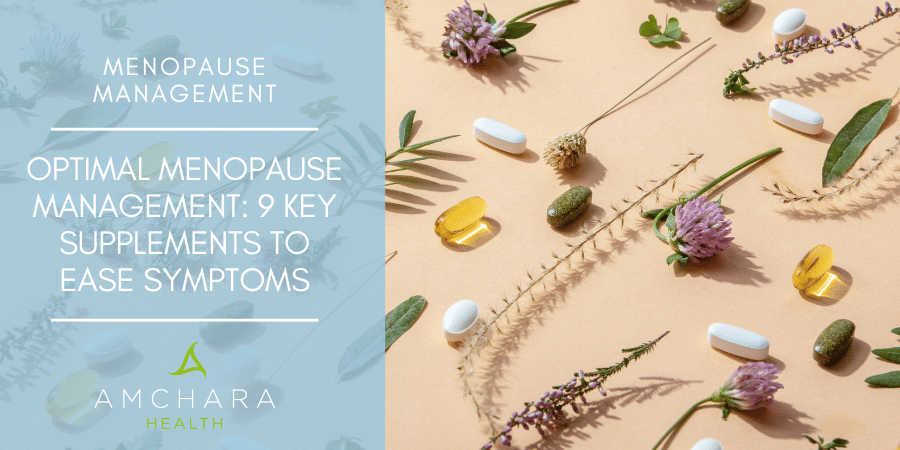Too much, prolonged and chronic stress can have a negative impact on your mind and your body, and can change the level of various hormones, and increase the risk of developing ill health and disease.
In the modern internet world there is an overwhelming amount of information; it can be hard for you to find health advice that you can trust, particularly as the main media channels are typically dominated with a single, orthodox narrative. We always take an evidence-based approach, orientated towards a holistic and Personalised Health approach, and aim to provide you with actionable knowledge and tips to help you on your journey to optimal health.
Reducing your stress can help you boost your hormonal health and overall wellbeing. In this article we will take a closer look at the impact of stress on hormonal balance and your body. We also provide you with strategies to manage stress, as well as useful nutritional advice and beneficial supplements.
How stress affects your body
Pressure and stress in modern daily life is unavoidable. Moderate levels of stress can actually be beneficial – the stress response can help you react appropriately if you are facing a perceived threat – the ‘fight or flight’ response is a way of protecting ourselves from danger.
But prolonged, unmanageable and chronic stress creates changes in hormonal levels, throwing them out of balance, and impacting your overall health.
Your brain responds to stressors by releasing a chemical messenger that stimulates your adrenal glands (situated just above your kidneys) to increase the production of the key stress hormones – adrenaline and cortisol.
The result of this is an increase in sweating, heart rate and muscle tension, raised blood pressure, increased blood flow to the muscles and brain, and raised blood sugar.
These mechanisms prepare you for a crisis – increasing your metabolic rate and providing you with the energy and power you need to help you to deal with any perceived danger.
While all this is happening your body is also diverting blood supply and energy away from other systems that are deemed less immediately important, such as your digestion and reproductive organs. When you are chronically stressed it can impact your weight and your fertility.
Long-term stress can also suppress your immune system and affect thyroid function.
During times of increased stress and greater demand, your body uses nutrients more rapidly to meet the increased biochemical needs of metabolism, which can cause a nutrient deficiency, preventing the body from producing adequate amounts of important hormones.
How to better manage stress
The impact of prolonged stress on hormonal balance can be overwhelming and detrimental to your health so it is important to try to manage it as naturally as possible.
We will now take a look at three key areas you can focus on to strengthen your ability to cope with and manage stress – strategies to help you, nutrition and supplements, and finally sleep.
Coping strategies
Negative coping strategies such as indulging in alcohol, cigarettes, caffeine or junk food may feel like they provide an initial and immediate relief, but in the long term these negative behaviours just cause additional stress on your body.
Instead, let’s focus on positive strategies to help you manage when you are feeling the pressure.
Nourish your body and stabilise blood sugar balance
You can enhance your ability to withstand stress with the help of specific nutrients, herbs and supplements.
Of particular use are nutrients that support the healthy functioning of the adrenal glands, which are vitally important to your health and wellbeing. The adrenal glands help your body to respond to stress and maintain energy levels.
Too much on-going stress can cause an imbalance in the adrenal hormones and may result in adrenal fatigue – which is when the adrenal glands are unable to meet the demands placed upon them.
Nutritional advice for adrenal and hormonal support
- 1
Eat plenty of fruit and vegetables– broccoli, cabbage, kale, spinach, peppers, watercress, strawberries, kiwi fruit, oranges and tomatoes are a good source of vitamin C, calcium and magnesium which help support energy metabolism and adrenal function.
- 2
Eat good quality protein with every meal– choose fish, poultry, eggs, nuts, seeds, lentils and beans. These foods provide the amino acids tyrosine and taurine. Tyrosine is necessary for the production of adrenal hormones and taurine is important for maintaining a calm and relaxed state of mind.
- 3
Food rich in B vitamins– eat fish, mushrooms, whole grains, green vegetables and eggs. B vitamins are vital for optimal adrenal function.
- 4
Increase the consumption of oily fish– herrings, mackerel, kippers, tuna, and sardines, as well as fish oil, nuts, seeds and flax (or flaxseed) oil are all rich sources of omega-3 essential fatty acids, low levels of which have been associated with an insufficient stress response.
- 5
Include flaxseeds, pumpkin seeds, sesame seeds and sunflower seeds regularly, which provide essential fatty acids as well as minerals such as calcium and magnesium.
- 6
Reduce tea, coffee and alcohol– stimulants like these raise blood sugar levels increasing stress on the body.
- 7
Balance blood sugar levels – avoid sugar and sugary foods including refined carbohydrates such as white bread, white pasta, and white rice. Include healthy fats and good quality protein at each meal to slow down the release of sugar into the blood.
Useful anti-stress supplements
- Rhodiola – helps increase the body’s resistance to stress.
- Ashwagandha – helps increase the body’s resistance to stress.
- Ginseng– helps the body adapt to stress.
- Omega-3 fish oils – studies on fish oil have shown that it can improve the body’s response to stress.
- Tyrosine – may help to improve mental function during stressful times.
- Vitamin C – helps to support adrenal function. The adrenal glands store large amounts of vitamin C which is quickly depleted during times of str
- Vitamin B5 (Pantothenic acid)– is perhaps the most important ‘anti-stress’ B vitamin. About 70% of this vital nutrient is stored in the adrenal glands where it plays an important role in the production of hormones that help counteract stress and enhance metabolism.
- Magnesium – once the adrenals become overworked and stressed, the body’s ability to retain magnesium lessens. People who are chronically stressed often have depleted magnesium levels. If taken about an hour before bed, magnesium helps calm the nervous system, relaxes the muscles and promotes restful sleep.
- Phosphatidyl serine– may help to balance cortisol levels.
Adequate sleep
Poor sleep can leave you feeling lethargic, irritable, and even depressed, and definitely less able to cope with stress.
Here are our top tips for a good night’s sleep:
- If you can manage to get your blood sugar under control this can make a huge difference. Nigh-time fluctuations in blood sugar levels often interrupt the normal sleep pattern leading to insomnia.
- Avoid caffeine in tea, coffee, chocolate and energy drinks in the hours before bedtime as they are stimulants and will keep you awake.
- Eliminate alcohol as it causes a release of adrenaline and interferes with the production of melatonin – the ‘sleep’ hormone.
- Use your bedroom for sleeping only – don’t use electronic devices or TV, the blue light of such devices suppresses the body’s release of melatonin.
- Relax before bedtime – take a hot bath, or do some meditation, yoga or breathing exercises. Some people find listening to relaxation recordings helps them get to sleep.
Takeaway
As we have seen, too much stress can have a negative impact on your mind and your body, and can change the level of various hormones, and increase the risk of developing ill health and disease.
Our retreats are designed to help you detoxify both physically and mentally. On an Amchara health retreat you will be immersed in a supportive and nurturing environment that enables you to switch off, relax and kickstart your health journey, including physical activities and empowering, educational talks. We offer yoga and other relaxing activities as well as nutritional advice to help you learn to better manage your stress and ‘Change for Good’.
Or if it is hard to find time to get away, you could try Amchara Juicery to improve your nutrition – cold-pressed, nutritious juices delivered to your door to help you boost your health, naturally. Created by Amchara’s expert in-house health team, you can enjoy a range of fresh, organic juice cleanses (and super soups) at home.




